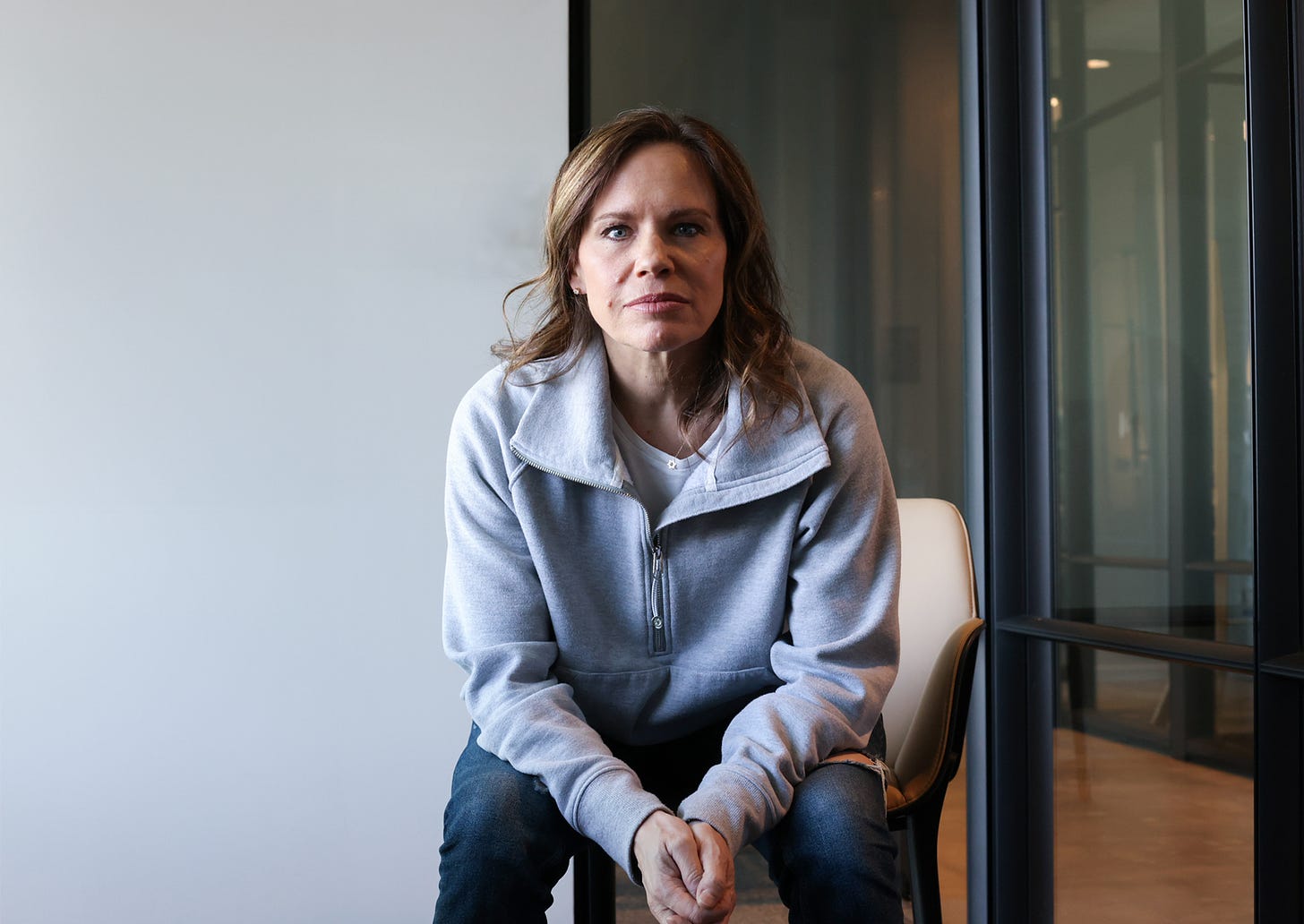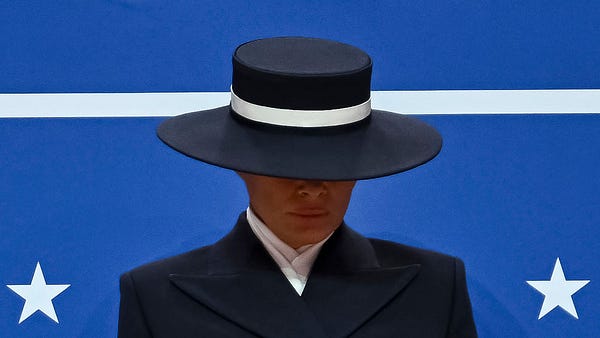
The Free Press

Today from The Free Press: Ben Kawaller meets the lady lowriders of Pasadena, Evan Gardner asks if the SAT is getting easier, Kat Rosenfield looks back on Christine Blasey Ford’s moment in the spotlight, and much more. But first, our lead story. . .
Here at The Free Press, we spend a lot of time reporting on things that are broken: broken institutions, broken politics, and a broken consensus.
Precisely because so much is broken, the most important stories right now are about the people trying to fix things—or build something completely new. People like the residents of Hazard, Kentucky, who Sam Quinones spoke to recently. He told the story of the locals, many of them former addicts, who are turning their town around after it was decimated by opioids. Or Seneca Scott. He’s the black activist trying to save Oakland, California, from its descent into lawlessness, who David Josef Volodzko profiled for The Free Press last October. Or Katherine Boyle, the venture capitalist and Free Press columnist helping to build a new, dynamic American defense industry.
In the coming months, we’re going to bring you more stories about builders—the people fixing problems rather than complaining about them, and creating new realities rather than imagining them. Today, we have our latest in the series, courtesy of The Free Press’s Julia Steinberg. She reports on the new wave of “classical schools” that aim to raise academic standards by bringing back some of the toughest—and most tried and tested—ways of learning.
Here’s Julia:
MENLO PARK, CA — On a rainy evening last January, a group of girls in long, pleated skirts and boys in jackets and ties were sitting around a mahogany table in an old house discussing Homer’s The Iliad.
It was parents’ night at Chesterton Academy of St. James, a private school in Silicon Valley, the fertile crescent of innovation. And even though the ninth- and tenth-graders were working through a text that dates to the eighth century BCE, the lesson felt—as Big Tech likes to say—disruptive.
Lily Ahern, 15, was talking about Priam, the father of the slain Trojan warrior Hector, who asks the Greeks to return his son’s body so he can be properly buried. Her teacher, a bespectacled man with a trim beard and wire-rim glasses, peppered Lily with questions: What did she make of Priam’s request? Was the Greek response morally defensible?
Every time Lily replied, her teacher pressed her to cite some passage from the text to support her argument. The whole back and forth—the sharing of premises and conclusions and points and counterpoints—seemed straight out of a Platonic dialogue. It was all so thoughtful, so measured, so wide-ranging. Students were free to argue anything (about the text, at least) as long as it was well reasoned. And as a 21-year-old who was taught what to think—not how to think—at my supposedly top-tier private school in Los Angeles, it felt liberating.
TO KEEP READING CLICK BELOW:
Ten Stories We’re Reading
To the Islamic State, everyone is an enemy. The terror attack in Moscow is a reminder that great power rivalries don’t matter to ISIS extremists. (WSJ)
How will Putin react to the attack? (BBC)
Biden is on a roll in the polls. He has led Trump in eight recent matchups. (Newsweek)
Moderate Republican senator Lisa Murkowski didn’t rule out leaving the party on Sunday. Of her party’s presidential candidate, she said: “I wish that as Republicans. . . we had a nominee that I could get behind. I certainly can’t get behind Donald Trump.” (CNN)
The outsider legal genius who could save Trump. “Seth Barrett Tillman is an Orthodox Jewish commodities trader turned law professor living in Dublin whose ideas were recently heard by the Supreme Court. He’s also something even more unusual: a thinker whose mind hasn’t been corrupted by politics.” (Tablet)
For the first time in the 35-year history of the Barkley Marathons, a brutal 100-mile footrace in rural Tennessee, a woman has finished. Only 20 people have ever completed it. (NYT)
Why is CNN using the same misleading language in all its stories about “gender-affirming care”? (Jesse Singal)
Why we should all feel terrible forcing Kate Middleton to reveal her cancer diagnosis. (The Atlantic)
Hey jackass, turn your bluetooth speaker down! A crotchety, but entirely correct take. (Andrew Sullivan)
Baseball is back! And its biggest star is at the center of a betting scandal. Nate Silver investigates. (Silver Bulletin)
Ben Kawaller Meets. . . The Lady Lowriders
Last week we announced the debut of our new video series Ben Meets America. Today, he reveals his latest subject: The Lady Lowriders of Southern California.
Here’s Ben:
A few weeks ago I attended an extralegal assembly of classic-car fanatics hosted by a Southern California–based society called the Lady Lowrider Car Club. The members had overtaken a Pasadena thoroughfare in celebration of International Women’s Month, which is the month we’re currently in, if you’re wondering why you’ve been seeing so many women lately.
I’m far too equivocating to address the question myself, but I wondered what the women bouncing down Colorado Boulevard in tricked-out Oldsmobiles thought of the idea, so often repeated in liberal America, that we live in a patriarchy.
Most of the women I spoke with did not think much of it, in fact. But I would later realize that my question was a bit facile; its answer depends on what is meant by “patriarchy.” My very smart sister, who is a Woman, pointed out to me that modern American life is still structured around the vestigial—she would say patriarchal—expectation that women won’t work; that’s why there’s no free childcare after 3 p.m., for example. Of course, the actual policy aims of any good liberal seeking to redress such gaps in our social welfare would benefit working men and women alike, despite the destructive-sounding demand of radical leftists that we “topple the patriarchy.”
The women I spoke to were more interested in “positivity” than in calls for revolution (“All Love No Hate!!” reads their Instagram bio). More than one of them, when I asked what America could learn from the Lady Lowriders, mentioned “unity.” And, while suggesting that they hadn’t always felt welcome in this male-dominated cultural space, many of them testified to the growing acceptance they’ve felt from their male counterparts in the lowriding community. “The men are starting to say, ‘Oh, these women can pretty much do what we can do,’ ” one member told me.
Does this count as toppling the patriarchy? I think the better way to aggrandize these women would be to view them as having staked out their territory through self-determination. And what could be more American than that?
But wait, there’s more!
And now, here’s Evan Gardner with a report from another fight for higher standards in education: standardized testing.
Elite schools have reintroduced standardized testing—but does a new, all-digital exam mean standards will slip?
The Christine Blasey Ford Fever Dream
Kat Rosenfield on the Bret Kavanaugh accuser’s new book, “One Way Back,” and peak #MeToo.
It was autumn 2018, just over five years ago, when Christine Blasey Ford uttered that unforgettable line. “Indelible in the hippocampus is the laughter,” she said, referring to the gleeful cackling of a young Brett Kavanaugh as he allegedly drunkenly pinned her down and pawed at her clothes in an attempted assault.
This sentence turned up on protest posters, infographics, it was even stenciled across a stone threshold on the campus at Yale University. But that was then. Today, in a review of Ford’s new memoir, One Way Back, its treatment is less than reverent: The New York Times describes it as “a piece of refrigerator poetry suddenly ringing out in the wood-paneled Hart Senate Office Building.”
One Way Back is a meandering, behind-the-scenes look at Ford’s choice to come forward about the alleged assault, which she said took place at a party in 1982, when she and Kavanaugh were both teenagers. It also functions as an airing of grievances—against the politicians, lawyers, and activists who turned her trauma into a political football, but also against those journalists who promised to tell her side of the story, with inevitably disappointing results: “I’d spend hours upon hours walking them through my story. Then their book would come out, and I’d read it and feel my world turning upside down all over again.” She wrote that that experience “feels like the opposite of the justice you so desperately seek.”
TO KEEP READING CLICK BELOW:
From Teen Gymnast to Sportswear CEO
During Covid, Jennifer Sey became famous for taking a stand. Now, she’s standing up for women in sports. Joe Nocera reports.
When we last checked in on our friend Jennifer Sey, she was in the middle of shooting a documentary, called Generation Covid, about the harm done to children because of pandemic-related school closings. Sey was outspoken on the issue of public-school closures while serving as the brand president of Levi’s. She faced public criticism and ultimately resigned from Levi’s after a 23-year career there, and later described what happened in a story for The Free Press in 2022.
The documentary is now in post-production, and her activism has a new focus: female athletes. She is starting a company, called XX-XY Athletics, which she describes as “the first athletic brand to stand up for women’s sports.” It goes live today with a series of t-shirts and sweats. Performance products like leggings will drop in May, Sey said. I recently talked to Sey over the phone and asked her what drove her to start this company.
JN: Why did your activism move from school closings to women’s sports?
Jennifer Sey: Actually, women’s sports has been near and dear to my heart for longer than anything else. I was an elite gymnast—I was national champion in 1986—and I experienced the abusive culture of the sport. I wrote a book about it in 2008, literally a decade before anyone else was willing to acknowledge it. And I produced a documentary—Athlete A (2020)—that prompted female gymnasts to demand safer training environments. So I think of this as more of a return to my earlier advocacy.
JN: All the big athletic brands are emphasizing women’s sports these days. Why is a company like yours necessary?
Jennifer: Sure, they pretend to champion women, but they’re really not standing up for women and girls’ sports. For instance, big brands celebrate the fact that trans-identified, male-bodied athletes are permitted in most sports to play against girls and women. And in many instances—like contact sports—it isn’t safe. They are taking opportunities from girls and women. We are pro-female and everyone deserves the chance to play. But women deserve a voice and fairness. And our brand is about protecting women’s sports and spaces and encouraging others to do the same.
JN: How is your new company going to convey that idea?
Jennifer Sey: Having worked at Levi’s, I understand the power of brands. They can be tools of culture in the same way that music and films and education are. And I think our company can normalize the idea of standing up for women and girls because you know what? Most people agree with us. They’re just too afraid of being canceled to say it.
JN: One last thing. What’s it going to be like to work for XX-XY Athletics?
Jennifer: Well, first of all, it’s female-run. And we’re designing with women’s needs and wants in mind. I also don’t want the kind of culture where everybody’s afraid that HR is going to come after them for saying a word that maybe was okay yesterday, but isn’t okay today. I want to work in an environment where we are focused on delivering amazing product, world-class marketing, but we also have open discussions and aren’t so sensitive that we take offense at every little thing. And we’re not going to have DEI training every five minutes. That is not a culture that begets innovation and creativity. We take our mission seriously but not ourselves. We’re having fun.
JN: Best of luck, Jen. The Free Press is rooting for you.
This interview has been edited for length and clarity.
Oliver Wiseman is a writer and editor for The Free Press. Follow him on X @ollywiseman.
And become a Free Press subscriber today:




















Andrew Sullivan - Ditto. You and I are on the same page. Noise pollution. Let's add it to the list of seven deadly sins.
Well Catslelove, just because it's rarely done, does not mean it's not worth doing!